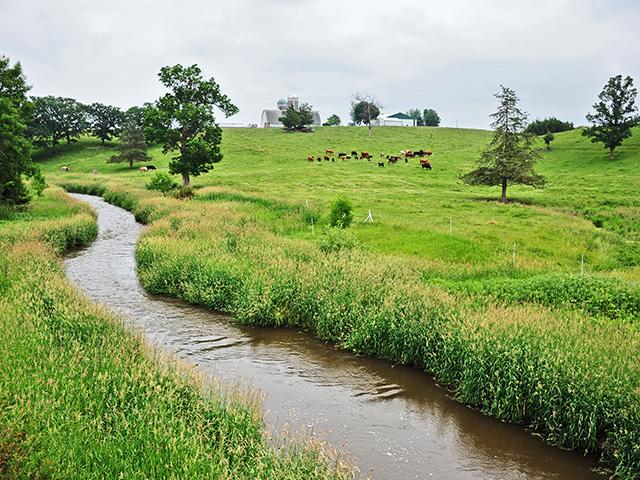Ag Groups Seek WOTUS Pause Nationally
Ag Groups Tell Court WOTUS Consequences Can be 'Stunningly Severe'
LINCOLN, Neb. (DTN) -- Agriculture and other industry interest groups asked for a national injunction against the waters of the U.S. rule in a federal court in North Dakota this week, telling the court the consequences of the rule can be "stunningly severe."
There are several moving pieces to this latest WOTUS saga. Earlier this week, the U.S. Senate passed a resolution of disapproval matching a resolution also passed by the U.S. House of Representatives earlier in March. President Joe Biden is expected to veto the measure.
In a motion for an injunction filed in the U.S. District Court for the District of North Dakota on Wednesday, the industry groups led by the American Farm Bureau Federation said leaving the rule in place nationally while a handful of court cases play out could harm their interests.
"Plaintiffs represent virtually every element of the national economy across the country," the groups said in a memo in support of the motion.
"They, their members, and their members' clients will be irreparably harmed if the rule is implemented before their legal challenges are resolved."
An injunction already is in place in Texas and Idaho, as a result of a motion granted by a judge in the U.S. District Court for the Southern District of Texas. That court also rejected ag and other industry groups' motion to intervene in the case.
P[L1] D[0x0] M[300x250] OOP[F] ADUNIT[] T[]
"The consequences of the rule are stunningly severe," the groups said in their motion. "A landowner can go to jail for even negligently interfering with a WOTUS she never knew was jurisdictional, and face potentially huge daily civil penalties, as well as suits from private interest groups. And if a CWA permit is required, it is expensive to obtain and often comes with costly-to-implement conditions. Because of these risks, if there is any doubt whether a feature is a WOTUS, landowners and users must either submit to expensive jurisdictional determination or permitting processes for features never before thought to fall within the CWA, or else forgo the planned use of the land."
Ag and other industry groups were allowed by the federal court in North Dakota to intervene in the lawsuit filed by 24 states.
States filing the lawsuit include Alabama, Alaska, Arkansas, Florida, Georgia, Indiana, Iowa, Kansas, Louisiana, Mississippi, Missouri, Montana, Nebraska, New Hampshire, North Dakota, Ohio, Oklahoma, South Carolina, South Dakota, Tennessee, Utah, Virginia, West Virginia and Wyoming. Their lawsuit alleges EPA and the U.S. Army Corps of Engineers have "toppled the cooperative federalism regime" by implementing a rule that is "overbroad and hopelessly vague."
The interest groups allowed to intervene include the American Farm Bureau Federation, American Petroleum Institute, National Cattlemen's Beef Association, National Corn Growers Association, National Pork Producers Council, Public Lands Council, U.S. Poultry and Egg Association as well as state-level ag groups and construction interest groups.
"The Texas district court discounted the need for uniform nationwide relief, in part relying on the fact that 24 States have brought the instant action," the groups said in their motion for an injunction this week.
"Further, the court declined to address plaintiffs' arguments regarding why nationwide injunctive relief was necessary to protect their members. But for the above reasons, nationwide injunctive relief is appropriate to protect the interests of the parties before this court -- including plaintiffs, who between them have millions of members located in every State -- and to avoid a harmful regulatory patchwork that would result from anything less than a nationwide injunction."
Also this week, AFBF President Zippy Duvall asked Biden in a letter to repeal the WOTUS rule.
"America's farmers and ranchers need a clear, consistent and transparent WOTUS rule so they can continue to protect our natural resources, operate with certainty, and create jobs in their communities," Duvall said in the letter on Thursday.
"Continual revisions, remands and reintroductions of WOTUS definitions only sow confusion and ultimately dissuade future investment in climate-smart agriculture. However, the new definition of WOTUS exceeds congressional authority in multiple respects, ignores recent Supreme Court case law interpreting the Clean Water Act and will be impossible to implement consistently in the field."
Read more on DTN: "Senators Vote to Overturn WOTUS Rule," https://www.dtnpf.com/…
Todd Neeley can be reached at todd.neeley@dtn.com
Follow him on Twitter @DTNeeley
(c) Copyright 2023 DTN, LLC. All rights reserved.



